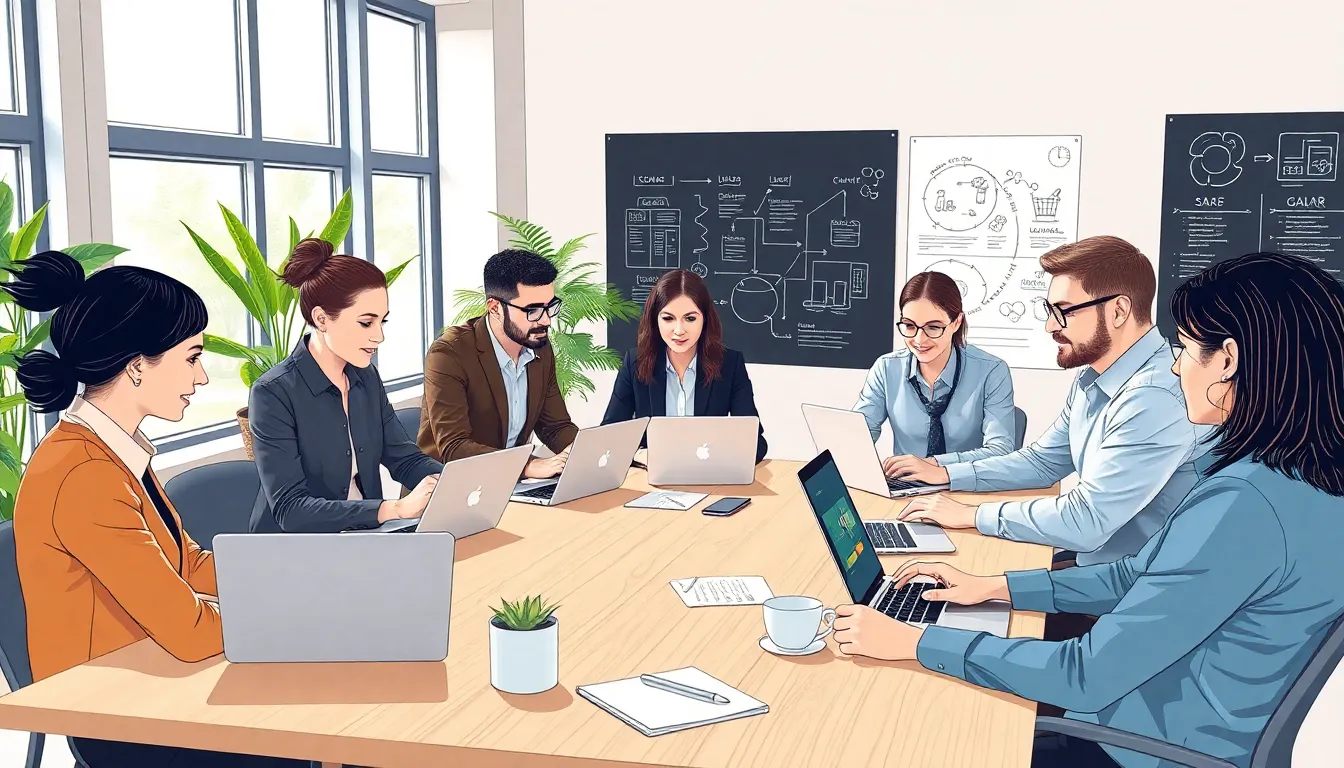In today’s digital age, businesses are no longer just selling products; they’re selling experiences. Enter B2C SaaS—where software as a service meets the everyday consumer. Imagine a world where your favorite apps not only solve problems but also make life a little easier (and maybe even a bit more fun). With B2C SaaS, that dream is a reality.
Table of Contents
ToggleUnderstanding B2C SaaS
B2C SaaS represents a significant evolution in the software industry, emphasizing seamless user experiences. This model allows consumers direct access to software applications via the internet, transforming interactions with technology.
Definition of B2C SaaS
B2C SaaS refers to software solutions designed for direct consumption by individual users. These applications emphasize convenience and value, simplifying everyday tasks. Examples include streaming services like Netflix and productivity tools like Slack. These platforms typically operate on a subscription basis, giving users flexibility and continual updates. B2C SaaS aims to evolve with user needs, ensuring ongoing engagement and satisfaction.
Key Characteristics
B2C SaaS features several distinct characteristics that differentiate it from traditional software models. First, users experience subscription-based access to applications, making it cost-effective and user-friendly. Flexibility is inherent, allowing users to engage with software across multiple devices. Updates happen automatically, keeping users connected to the latest features without manual installations. User-focused design is pivotal, enhancing overall satisfaction and retention. Scalability allows companies to grow with user demands, adapting to various markets and sectors.
Benefits of B2C SaaS

B2C SaaS offers several advantages that enhance user experience and streamline operations for businesses and consumers. These benefits include cost-effectiveness, scalability, and more.
Cost-Effectiveness
B2C SaaS solutions reduce upfront software costs for users. Instead of hefty one-time fees, subscription models provide access to regularly updated features and functionalities at a lower monthly cost. Companies eliminate maintenance expenses associated with traditional software installations, which require continuous updates and hardware upgrades. By leveraging cloud infrastructure, providers ensure that users pay only for what they need, allowing for efficient budgeting. This makes robust software accessible even for budget-conscious consumers.
Scalability
Scalability stands as a crucial benefit of B2C SaaS. Users can easily adjust their subscription plans based on evolving needs. As businesses grow, they can add more features or increase usage without facing significant hurdles. Providers often offer tiered pricing structures, allowing clients to select packages that align with their requirements. This flexibility allows consumers to scale services up or down, accommodating changes without disruption. Additionally, this adaptable nature fosters an optimal user experience by ensuring that tools remain relevant over time.
Challenges of B2C SaaS
B2C SaaS faces several challenges that affect both providers and users. Among these, customer retention and market competition stand out as critical factors.
Customer Retention
Maintaining customer loyalty in B2C SaaS proves essential for revenue stability. Users expect constant value from subscription services. If services fail to deliver regular updates or new features, customers may quickly switch to competitors. Companies must focus on creating personalized experiences tailored to user preferences. Engaging with customers through feedback mechanisms enhances satisfaction and encourages long-term subscriptions. Tracking customer behavior offers insights into usage patterns, allowing companies to refine their offerings. Retention strategies must incorporate timely support and clear communication to address concerns, fostering trust and commitment.
Market Competition
High competition defines the B2C SaaS landscape, with numerous companies vying for consumer attention. Unique features and service differentiation play crucial roles in capturing market share. Startups and established companies alike face pressure to innovate continuously. Pricing strategies must appeal to budget-conscious consumers while ensuring profitability for providers. Online reviews significantly influence purchasing decisions; therefore, maintaining a positive reputation is vital. Understanding competitor offerings can also help refine marketing tactics. Continuous research helps companies adapt to changing consumer demands and stay ahead in a crowded marketplace.
Successful Examples of B2C SaaS
B2C SaaS companies have transformed consumer interactions with technology by providing innovative solutions that enhance daily life. Here are notable examples that illustrate this impact.
Case Study: Company A
Company A is a leading platform in the fitness industry. It offers a subscription-based service that grants users access to a library of workout videos, personalized training plans, and nutrition tips. Users enjoy flexibility in choosing workout styles, ranging from yoga to high-intensity interval training. Their user-friendly app tracks progress and allows for community engagement, fostering motivation and accountability. By continuously adding new content, Company A keeps subscribers engaged and satisfied, enhancing retention rates.
Case Study: Company B
Company B operates in the financial services sector. It provides budgeting tools and investment tracking features to help consumers manage their finances effectively. Users benefit from real-time data synchronization across devices, ensuring access to financial information anytime, anywhere. Company B’s intuitive interface simplifies complex financial concepts, making budgeting accessible for all users. Regular updates introduce new features based on user feedback, reinforcing the platform’s relevance and contributing to long-term customer loyalty.
Future Trends in B2C SaaS
Emerging trends in B2C SaaS shape the industry’s trajectory, fostering innovation and enhanced user interaction. Key areas of focus include AI and machine learning, as well as personalization and user experience.
AI and Machine Learning Integration
AI and machine learning revolutionize B2C SaaS applications, enabling intelligent data analysis and automation. Many businesses adopt these technologies to predict user behavior, enhancing product offerings in real-time. Predictive analytics allow organizations to tailor services based on customer preferences. Additionally, chatbots address inquiries instantly, improving customer support without significant operational costs. Streamlining workflows through AI-driven tools also maximizes efficiency, allowing companies to focus on strategic initiatives.
Personalization and User Experience
Prioritizing personalization becomes essential in B2C SaaS as consumers demand tailored experiences. Companies leverage user data to customize content and interface designs, catering to individual needs. Enhanced user experience contributes to higher engagement, attracting customers and retaining loyalty. Adaptive recommendations based on prior interactions serve to enrich user satisfaction. Overall, focusing on unique customer journeys fosters long-term relationships, driving sustainable growth in the competitive B2C SaaS landscape.
B2C SaaS is reshaping how consumers interact with technology by prioritizing convenience and user satisfaction. As companies strive to deliver personalized experiences and innovative solutions, they must also navigate the challenges of customer retention and market competition. The evolving landscape demands continuous adaptation to meet user expectations and leverage emerging technologies.
By focusing on scalability and value, B2C SaaS providers can enhance their offerings and foster long-term relationships with consumers. With the right strategies in place, businesses can thrive in this dynamic environment, ensuring they remain relevant and competitive. The future of B2C SaaS looks promising, driven by a commitment to innovation and a deep understanding of consumer needs.



